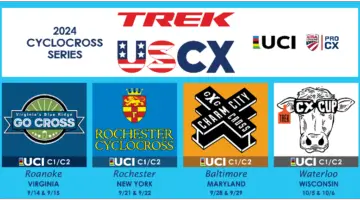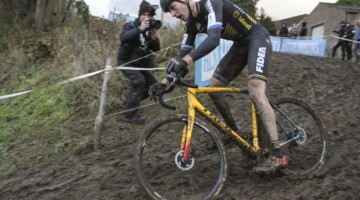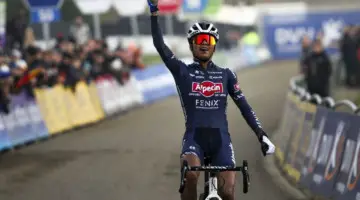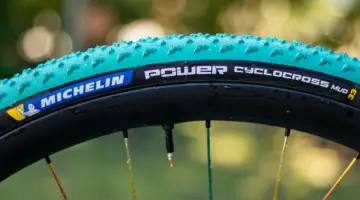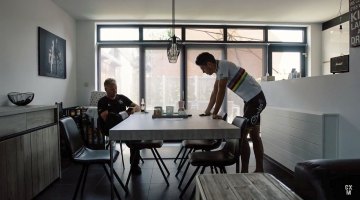And now: the unavoidable question about disc brakes…
In contrast to what the press has said, I don’t have a bike with disc brakes yet. It’s technological progress, and technological progress is good for the sport. In my case, a real test hasn’t been performed yet. [Ed. note: Walsleben tested disc brakes on his Colnago Cross Prestige at the Gieten Superprestige race as seen below]
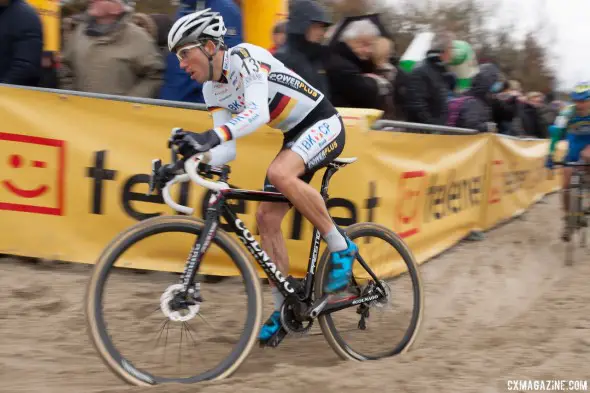
Philip Walsleben riding Shimano R785 hydraulic disc brakes in Gieten, Netherlands – © Thomas van Bracht / Cyclocross Magazine
You’ll probably only race once in Germany, the German championships. What has to happen so that the German ’cross scene, which is growing remarkably in all fields (licensed and hobby racers), can develop? And so that you can race in a few races here?
My participation in German races depends on the Belgian calendar and the various series (Bpost, Superprestige and World Cup). At the moment, these races fill my calendar completely. In consideration of my team, it’s not possible to exchange one of these races for a German race that has (almost) no press or TV. Either the calendar in Belgium has to be reduced, or one of these important races has to take place in Germany.
What’s the best and worst part about your life as a professional?
The best part is that you can race every weekend in front of such a huge audience and even make money in the process. And you have something that you can commit to 100%, which is usually worthwhile. I sense in a “normal” job that can be different sometimes.
The worst? Honestly? Staying in Belgium during the season. But it sounds worse than it is. There just aren’t too many other negative things.
Belgium, a tough and somewhat depressing place. But you have to be there, don’t you?
Yes, I do. It belongs to the 100%. I can—and am allowed to—live in Kleinmachnow, but that isn’t without compromise.
And traveling is probably a pain. Do you have a tip for racers? Something that is sometimes forgotten or underestimated, or maybe a trick for cornering technique, choosing a line, starts?
Technically speaking, you can do things better if you do them often. So don’t just do a short ride along a short curvy path in training; spend 30 minutes on a really short curvy loop. For example, in my case it’s jumping barriers. So don’t just put up barriers on your training loop, but jump over the damn things over and over by riding back and forth again and again. And, of course, concentrate: barriers are an all or nothing deal. If you practice sand corners, then you have to be fully concentrated every time; don’t just ride around. And changes are good in training—get away from one standard speed.
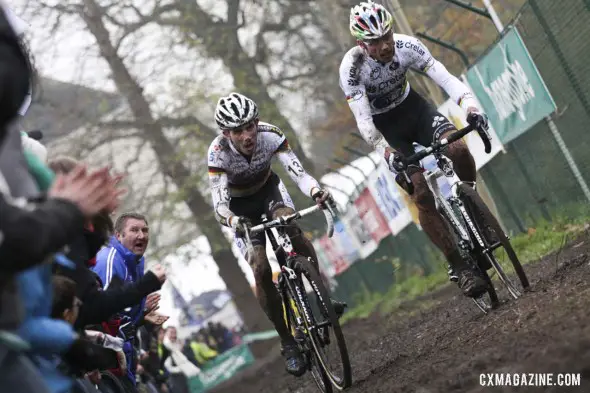
Sven Nys, right, and Philipp Walsleben battle at the Gavere Superprestige. © Bart Hazen / Cyclocross Magazine
How do you manage to stay concentrated and avoid technical mistakes when you are redlining to stay on Nys’ back wheel?
To be honest, I don’t! The careful observer will have noticed an occasional slow lap of mine—about one per race sometimes. That’s when I’ve gone over my limit. See Hamme-Zogge.
Yes, when your mouth is really open, you get the sense that you are in pain… but it makes you human and likable for the audience. The audience wants to see the effort. From the rider’s perspective, do you find this aspect of the spectacle—it’s almost like theater—odd sometimes? You are entertainment.
Yes, ’cross cuts both ways here. In terms of sports, no one would prepare for a World Championship like this—well, maybe a fool.
It’s a show, isn’t it? Just too many races.
Yes, lots of races, but honest competition, since everyone has the same program. And it’s a show on the outside—but for us, it’s a real battle.
Is there anything you need to work on? What are your next important goals?
During the season I need to watch out that I have recovered before every race. Eventually it’s a bit of a challenge to keep up a serious lifestyle. At the beginning of the season, it’s not a problem, but after about two months a routine kicks in—then a change would help. But changes usually lead to sub-optimal form.
Thanks to CROSSMASTERS Sponsor Vehikel Translations for providing us with the English version of the Philipp Walsleben interview.











